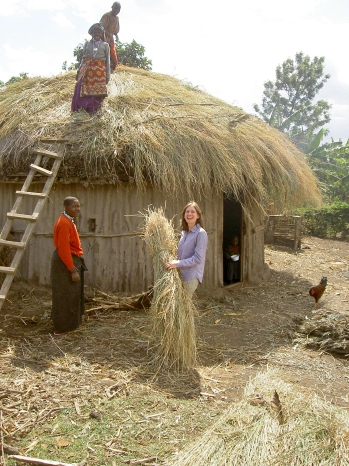COVER STORY
Cornell's global citizens roll up their sleeves and tackle real-world problems

Nutritional sciences graduate student Anna Herforth, center, helps Masai women re-roof a home in Kimnyak, Tanzania, in 2007. She returned the following year to work on another household survey about diet and nutrition. See larger image
"We live in a much more international world than our grandparents grew up in," says Pell, "and if students are going to succeed in this new environment, they need to know more about different cultures and how these worlds are connected."
"The impact on our students is immeasurable," says Christy, director of the Cornell International Institute for Food, Agriculture and Development. "They are making significant contributions in poor communities, and at the same time experiencing tremendous personal growth."
As the world grows increasingly interdependent, students are finding they need to deepen their understanding of world markets and other cultures to address problems whose solutions require international and interdisciplinary collaborations to compete globally. "You interact with local people -- speaking their language in their communities," says Stephanie Leonard '10, a human biology, health and society major, who spent last summer in Bangladesh to study mothers' abilities to care for infants -- preparing by studying Bangla for a year. "It deepens your understanding of the problems and it makes it much more personal."
No college at Cornell has met these international education needs more energetically than the College of Agriculture and Life Sciences, which in 2007 issued a strategic plan for international programs aimed at bringing about "a significant change in how we train students." The plan boldly stated that merely adding specialized courses that students may elect -- such as tropical soils, agronomic crops of the world or international agricultural development -- is not enough. "Instead, internationalization must pervade the curriculum."
Cornell leads an international trend
Exporting U.S. expertise, learning from other cultures and arranging scholarly exchanges between students and faculty has grown exponentially across American academia as distance learning and the Internet have brought international reach to many universities across the United States.